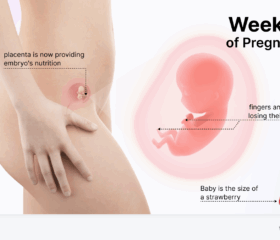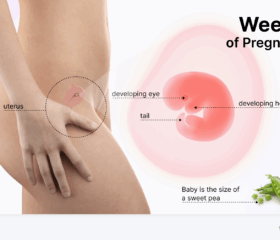Pregnancy Week by Week
31 Weeks Pregnant
Your baby is as big as a coconut.
16.18
inches
3.31
pounds
31 Weeks Pregnant: What to Expect as You Near the Finish Line
At this stage, your baby is growing fast, and you’re experiencing plenty of changes of your own. Let’s dive into what you can expect during this week.
Your baby's development at 31 weeks
The keyword for this week is growth: your baby is gaining fat and developing that newborn pudge. She weighs around 3.31 pounds and is about 14–16 inches long, potentially a little more. That’s about the size of a coconut, but she won’t stay that size for long! 1 2
Here’s a quick peek at what’s happening to her during week 31:
- Brain growth: Your baby’s brain is one of the last organs to develop, but when it finally happens, it’s fast. Your baby’s nerve cells are forming new connections at a rapid rate, which will only accelerate in the next few weeks. 3
- Sensory development: By now, your baby can see light and dark, hear voices, and feel your touch. If you gently tap on your belly, you might feel an answering kick. She can also taste and smell the food you eat in your amniotic fluid. Her eyes can also open and close, even though she doesn’t have much to look at in there. 4 5
- Activity: Your little one has become quite the acrobat! Besides kicks and somersaults, she’s practicing important skills like swallowing and breathing. As she grows, though, she’ll have less room to move, so she should slow down closer to birth, but should still continue to meet her daily kick count recommendations. 6 7
- Sleep patterns: Your baby is sleeping for longer, and you’ll probably start to notice a routine develop. 8
- Loss of lanugo: She’ll also start to lose that fine, downy baby hair called lanugo (which covers her skin) around this time.
By now, your baby can recognize familiar voices, so this is a great time to introduce her to your record collection. Hearing a sound she remembers from the womb might comfort her after birth, just like your own voice will.

Your body at 31 weeks: physical changes and symptoms
Your uterus has been expanding for the last few weeks, pushing your organs around to make room for your baby. That includes your lungs, you may find yourself breathless from time to time, especially if you’ve been exerting yourself.
Once your baby “drops” into your pelvic area (which will happen closer to your delivery date), you’ll be able to breathe easier. For now, standing up straight, eating smaller meals, and sleeping propped up on your left side can help give your lungs more space to expand. 9
This is also when you develop the trademark “waddle.” Your baby has changed your center of gravity and added a lot of extra weight, which makes your steps wider and shorter. It can also make you clumsier, so take it easy and don’t move too fast.
Frequent urination or incontinence
Your lungs aren’t the only organs feeling the pressure: your bladder is also getting bullied by your uterus. That, plus the loosening of your ligaments and pelvic floor muscles in preparation for the big day, can lead to more frequent trips to the bathroom.
Needless to say, this can be annoying. “Double voiding”—peeing twice in a row—can help you make sure you’ve fully emptied your bladder.
All that pressure on your bladder and pelvic floor muscles may also lead to incontinence—in other words, leaking urine. Even a simple sneeze can be enough to challenge your loosened muscles. This is a very common symptom, so don’t feel embarrassed; anyone you know who’s been pregnant before will sympathize.
You can strengthen your pelvic floor muscles with specialized physical exercises like Kegel exercises, which can reduce the likelihood of leaks. Additionally, a referral to pelvic floor therapy might be helpful—but always talk about these options with your doctor first! 10
Pregnancy brain
In week 31, you might find yourself forgetting where you put things or what you were about to say. Some people call this pregnancy brain or “momnesia,” and it often seems to kick in during the third trimester.
There isn’t a definitive scientific explanation for why you might experience memory issues in your third trimester. Possible answers are that your body is pumping a lot of hormones around or that you’re just ultra-focused on your upcoming delivery. 11
If you’ve been having trouble getting enough sleep (and who can blame you, with all your other pregnancy symptoms?), that can affect your memory, too.
All that said, don’t hesitate to talk to your doctor if you (or your friends or partner) are concerned that your lapses in memory are getting serious.
Other common pregnancy symptoms at 31 weeks
Here are some of the other symptoms and experiences you might have during this week:
- Braxton Hicks contractions: Sometimes triggered by dehydration, these painless contractions are just the dress rehearsal for the real event. If you’re unsure whether what you’re feeling are Braxton Hicks contractions or true labor, talk to your doctor or midwife. 12
- Back pain: That growing belly can put a strain on your back, leading to aches and pains. It can also cause sciatica, a sharp or dull pain extending from your lower back to your buttocks and trailing down your legs. Low-impact exercises like swimming and gentle stretching can soothe these aches. Physical therapy, acupuncture, prenatal massage, and a pregnancy or belly band may all be helpful as well.
- Leaky breasts: You may start leaking colostrum, a yellow or orange fluid that will be your baby’s nutrient-rich first milk. This is a sign that your body is getting ready to feed your newborn. It’s also a nuisance, but adding nursing pads to your bras can keep your shirts from getting wet.
- Sleep issues: As mentioned, all these symptoms can make it hard to get a good night’s sleep. Try using a pregnancy pillow for extra support when you sleep on your side or pamper yourself with a relaxing bedtime routine to help you ease into dreamland faster. If you just can’t get any shut-eye, bring it up with your doctor.
- Nail changes: You might find your fingernails cracking and your cuticles drying out, or they might grow faster than usual. Both of these are influenced by your personal cocktail of hormones and should clear up after you give birth. 13
- Headaches: Muscle tension from the added weight of your growing baby, lack of sleep, and dehydration can all be the source of your headaches. 14
Preparing for labor and delivery
With your due date approaching, it’s a good time to start preparing for labor and delivery. Three ways you can ready yourself include:
- Pack your hospital bag: Of course, you should stock this with essentials, like toiletries, comfortable clothes, and nursing bras. Don’t skimp on the items that will make your stay more comfortable, such as lip balm, hair ties, a brush, moisturizer, cozy socks, and slippers.
- Learn common labor signs: Get to know the signs of labor, such as regular contractions, period-like cramps, vaginal bleeding or spotting, a constant backache, diarrhea, and a tightening feeling in your uterus. Knowing these can help you figure out if it’s just Braxton Hicks contractions you’re feeling or if it’s time to go to the hospital. However, if you’re ever unsure, talk to your doctor. 15
- Prepare for breastfeeding: If you plan to breastfeed, take time to learn about what a proper latch is, how to avoid common challenges like clogged nipple pores (milk blebs), and what to do to make breastfeeding easier.
As you get closer to your due date, you may feel a surge of energy to clean and organize. This is called “nesting” and is completely normal, though there isn’t much scientific evidence to explain why so many women seem to feel it. It might simply be a way to feel more prepared for your baby’s arrival.
Regardless, if you feel the urge to do some nesting, clean and tidy to your heart’s content, as long as you stay hydrated and take breaks. Just remember that your baby won’t know what a spotless house really means until she’s a lot older—don’t overwork yourself on her behalf!
Create a birth plan
Your birth plan should map out your preferences for labor and delivery, including how you’d like to manage your labor pain. Your options range from getting an epidural (a shot of local anesthetic) to an unmedicated birth.
Some women may prefer to give birth without anesthesia, but opting for pain control is perfectly safe. Either way, this isn’t a decision you want to make in the moment, so talk to your doctor about the pros and cons of both options.
Ultimately, your healthcare provider can’t guarantee everything will go according to plan, and their priority will always be ensuring the health and safety of you and your baby. But going in knowing what your options are and what you’d prefer is still a good idea.
Plotting out all these details can get confusing, so consider looking into pregnancy trackers with a birth plan generator.
Tips for staying healthy and comfortable
As you get closer to delivery, it’s important to keep yourself healthy and sane. Here are the things to prioritize as you enter the final weeks of your pregnancy:
- Stay active: The best pregnancy workouts include gentle exercises like walking, swimming, or prenatal yoga (as long as your doctor approves). These activities can help with muscle tension and even prepare your body for labor.
- Maintain a healthy diet: You’ve heard this a hundred times, but drink plenty of water and eat a balanced pregnancy diet with plenty of fruits, vegetables, and whole grains. It’s a classic for a reason!
- Choose comfortable shoes: This is a good idea not just to accommodate your swollen feet and ankles, but also to ease the postpartum swelling that’s soon to come. You may want to opt for elasticized slippers or flip-flops for your postpartum footwear. Wearing support hose can reduce your leg swelling in the here and now.
- Visit the dentist: A study from the American College of Obstetricians and Gynecologists found that about 40% of pregnant women had some kind of periodontal disease, so dental check-ups are a must. On that note, dental x-rays are generally considered safe during pregnancy, but often your dentist will still wait until after your baby is born. 16
- Get mental health support: It’s normal to experience a range of emotions during pregnancy. If you feel overwhelmed, anxious, or depressed, reach out to a mental health professional.
- Babyproof your home: Get a headstart on protecting your baby from common hazards by covering electrical outlets, securing your cabinets, and so on. You still have a few weeks to get this done, but it can’t hurt to start early!
Final thoughts
With every passing day, you get closer to holding your baby in your arms for the first time. Your emotions may be overwhelming—but you have people here to help you through these last few weeks.
Be gentle with yourself, lean on your loved ones (and doctor) as much as you need, and prepare to welcome your baby into the world!
Article Sources
- UMHS Algorithms. "31 weeks - 32 weeks" Retrieved June 25, 2025.
- Human Biology. "Fetal Development" Retrieved June 25, 2025.
- New York State Department of Health. "Why Is 40 Weeks so Important?" Retrieved June 25, 2025.
- Office on Women's Health. "Stages of pregnancy" Retrieved June 25, 2025.
- The University of Texas Southwestern Medical Center. "Womb with a view: Sensory development in utero" Retrieved June 25, 2025.
- University of Illinois Hospital & Health Sciences System. "You and Your Baby: Month-by-Month" Retrieved June 25, 2025.
- MedlinePlus. "Fetal development" Retrieved June 25, 2025.
- Cleveland Clinic. "Fetal Development" Retrieved June 25, 2025.
- MedlinePlus. "Problems sleeping during pregnancy" Retrieved June 25, 2025.
- Penn Medicine. "News and views" Retrieved June 25, 2025.
- The University of Texas Southwestern Medical Center. "Is ‘pregnancy brain’ real or just a myth?" Retrieved June 25, 2025.
- The University of Texas Southwestern Medical Center. "False alarm: Braxton Hicks contractions vs. true labor" Retrieved June 25, 2025.
- Sanford Health. "10 things you didn’t know about pregnancy" Retrieved June 25, 2025.
- American College of Obstetricians and Gynecologists. "Headaches and Pregnancy" Retrieved June 25, 2025.
- MedlinePlus. "Am I in labor?" Retrieved June 25, 2025.
- American College of Obstetricians and Gynecologists. "Oral Health Care During Pregnancy and Through the Lifespan" Retrieved June 25, 2025.







